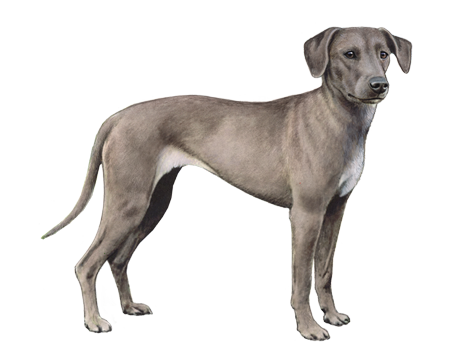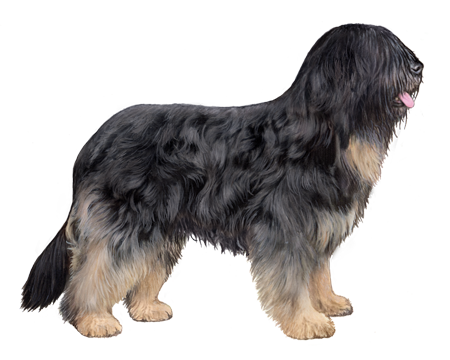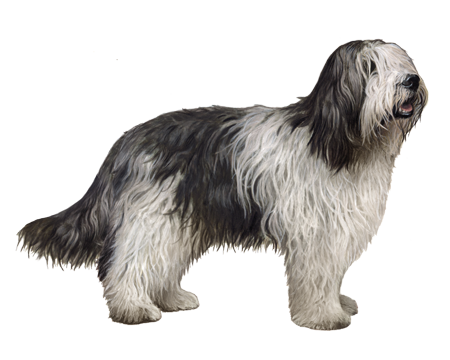
White Swiss Shepherd
This herding dog is an active and loyal family pet—and even does well with children—as long as they are properly trained and socialized from a young age. It’s important to know they have a high prey drive and protective instinct, and they also tend to get bored easily; they can become destructive when they aren’t properly stimulated with exercise.
Interested in discovering if your dog is a White Swiss Shepherd?
Check out Wisdom Panel's DNA tests.

White Swiss Shepherd Traits
General Appearance
These powerful, medium-sized dogs have many of the same hallmark characteristics of a German Shepherd. They are elegant and handsome, with a chiseled head, almond-shaped eyes, elongated, triangular ears, and a strong jaw. They are firm of body and built for activity.
Coat and Coloring
The White Swiss Shepherd has two coat varieties, one medium and one long. Both of these are dense double coats that can be slightly wavy with a bushy tail. As the name implies, the breed is entirely white.
Distinctive Physical Traits
Although most of the White Swiss Shepherd body is similar to that of other shepherd breeds, the pure white coat of the White Swiss sets it apart from the rest.
White Swiss Shepherd Temperament
The White Swiss Shepherd is generally versatile and alert, lively, and friendly. A dog of this breed that is properly socialized should get along well with other people and animals.
The White Swiss Shepherd does have a protective streak, but when properly trained and socialized from a young age, they are lively and friendly dogs that get along well with people and other dogs. They can get bored easily, though, so keeping them stimulated both mentally and physically is important.


White Swiss Shepherd History
The White Swiss Shepherd has its origins in the Thuringian region of Germany. There, the White Shepherd was a precursor to the popular German Shepherd dog, and in fact its body type made it one of the breeds selected to create the German Shepherd. For almost a century, there was little discerning between the German Shepherd and the White Shepherd. Then, in the 1930s, the white-colored dog was removed from shepherd breeding, and it almost became extinct.
By the 1960s the White Shepherd had made a comeback, and in the U.S. and Canada it was distinguished as a separate breed. In the early 1970s, some of these dogs were sent to Switzerland, where they prospered and multiplied. The new White Swiss Shepherd breed was added to the Swiss Stud Book in 1991, and in 2017 the Kennel Club of the United Kingdom officially recognized the breed as well.
White Swiss Shepherd Care
Nutrition
White Swiss Shepherds require a high-quality dog food that is age-appropriate—whether it’s commercially manufactured or homemade (with a veterinarian’s supervision and approval). It’s important to monitor the amount of food you give your White Swiss Shepherd. Reduce the portions or restrict calories if your pup gains weight.
Your veterinarian is always a good source to help provide you with appropriate nutrition and feeding guidelines.
Grooming
The White Swiss Shepherd comes in two coat lengths: medium or long. Either one sheds heavily and requires regular weekly brushing to remain healthy.
All dogs require regular dental care, including at-home teeth brushing and professional dental cleanings, and the White Swiss Shepherd is no exception. Maintaining good dental hygiene is important for their overall long-term health.
Exercise
White Swiss Shepherds can be low-key when indoors, but they require a good amount of exercise to stay healthy. Two or three daily walks can keep them happy and help them avoid boredom. They make great candidates for dog activities like agility.
Training
White Swiss Shepherds are smart dogs, although they can be sensitive at times, so reward-based training is the best way to go. Early and proper training and socialization is important for this breed, which can be wary around strangers and grow bored quickly. When properly trained, they make excellent family companions.

White Swiss Shepherd Genetic Health Conditions
-
MDR1 Medication Sensitivity
The MDR1 gene variant causes a defect to a drug pumping protein that plays an important role in limiting drug absorption and distribution (particularly to the brain). Dogs with the MDR1 variant may have severe adverse reactions to some commonly used medications.
Knowing if your White Swiss Shepherd is a carrier or at-risk for these conditions can help you and your veterinarian plan for your pup’s lifelong care. With Wisdom Panel™ Premium, you can get results for over 200 genetic health tests.
Breed Group
Herding
The herding group is a diverse category. These highly intelligent breeds were developed to guard and control the movement of livestock.























































